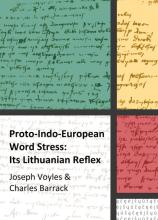Submitted by Michael Neininger
on
This year Joe Voyles and Charles Barrack--with essential editorial assistance from daughter Christina Voyles and husband Robert Hubble--finished a book, "Proto-Indo-European Word Stress: Its Lithuanian Reflex" (LINCOM Studies in Indo-European Linguistics 53. 246 pages. 2020). The development of Lithuanian word stress has long lent itself to misinterpretation. Many have considered Lithuanian word stress as somehow directly reflective of that of Proto-Indo-European (PIE).
The crux of the problem is the fact that long vowels and diphthongs in Lithuanian evince two types of stress, an acute as well as a circumflex (the latter represented by a superscripted tilde, i.e. a squiggle). The squiggle has often been assumed to have existed in PIE. Well, it didn't. Voyles and Barrack have demonstrated that the Lithuanian squiggle can be derived from a squiggleless PIE by reasonable and otherwise attested types of phonological change. (All the phonological changes from PIE into the Lithuanian of the early 1500's have been for the first time explicitly formulated in this book.)
It is likely that the book will not be well-received by a number of Lithuanian (as well as other) scholars: For some time some linguists have touted Lithuanian as that modern Indo-European language, particularly in its word-stress rule, closest to PIE. Well, it isn't. Indeed, there is even at least one web site depicting Adam and Eve, in the buff in the Garden of Eden, speaking Lithuanian. And the eminent French linguist Antoine Meillet is reported to have said that if you want to hear how PIE sounded, go listen to a Lithuanian peasant talk. Now you can listen to all the Lithuanian peasants you want, you still won't be hearing any PIE stress patterns.
In spite of all this it should be emphasized that Voyles and Barrack intend no disrespect to Lithuania, its language or its linguists. Rather than reflecting PIE, the glory of Lithuanian and Lithuanians is that they have been able to survive and even thrive and to preserve their language and their culture: Lithuania grew up in a very tough neighborhood. They are doubtless stout-hearted good people. They deserve our respect.
